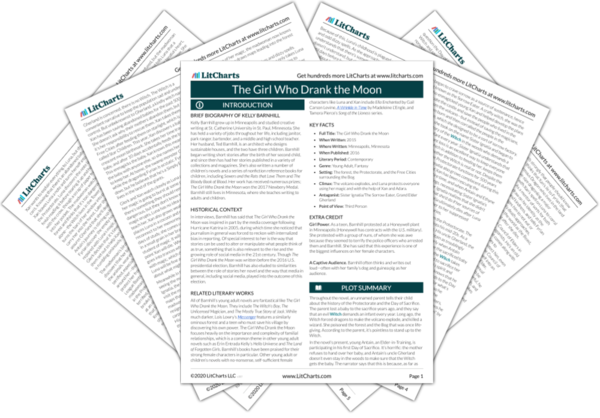Grand Elder Gherland Quotes in The Girl Who Drank the Moon
They left knowing that there surely wasn’t a witch. There never had been a witch. There were only a dangerous forest and a single road and a thin grip on a life that the Elders had enjoyed for generations. The Witch—that is, the belief in her—made for a frightened people, a subdued people, a compliant people, who lived their lives in a saddened haze, the clouds of their grief numbing their senses and dampening their minds. It was terribly convenient for the Elders’ unencumbered rule.

Unlock explanations and citation info for this and every other The Girl Who Drank the Moon quote.
Plus so much more...
Get LitCharts A+(“But what if they all are important, Uncle?” Antain had asked the Grand Elder once.
“They can’t possibly be. In any case, by denying access, we give our people a gift. They learn to accept their lot in life. They learn that any action is inconsequential. Their days remain, as they should be, cloudy. There is no greater gift than that. Now. Where is my Zirin tea?”)
Luna didn’t have very many memories that were as tenacious as this one—her memory, typically, was a slippery thing, and difficult to pin down—and so she hung on to it. This image meant something. She was sure of it.
Her grandmother, now that she thought about it, never spoke of memories. Not ever.
While it was annoying to have to go hungry in one’s own home, there was always sorrow aplenty throughout the Protectorate, hanging over the town like a cloud.
Or normally there was. But this blasted hope stirred up by Antain was spreading through the town, disrupting the sorrow. Sister Ignatia felt her stomach rumble.

Grand Elder Gherland Quotes in The Girl Who Drank the Moon
They left knowing that there surely wasn’t a witch. There never had been a witch. There were only a dangerous forest and a single road and a thin grip on a life that the Elders had enjoyed for generations. The Witch—that is, the belief in her—made for a frightened people, a subdued people, a compliant people, who lived their lives in a saddened haze, the clouds of their grief numbing their senses and dampening their minds. It was terribly convenient for the Elders’ unencumbered rule.

Unlock explanations and citation info for this and every other The Girl Who Drank the Moon quote.
Plus so much more...
Get LitCharts A+(“But what if they all are important, Uncle?” Antain had asked the Grand Elder once.
“They can’t possibly be. In any case, by denying access, we give our people a gift. They learn to accept their lot in life. They learn that any action is inconsequential. Their days remain, as they should be, cloudy. There is no greater gift than that. Now. Where is my Zirin tea?”)
Luna didn’t have very many memories that were as tenacious as this one—her memory, typically, was a slippery thing, and difficult to pin down—and so she hung on to it. This image meant something. She was sure of it.
Her grandmother, now that she thought about it, never spoke of memories. Not ever.
While it was annoying to have to go hungry in one’s own home, there was always sorrow aplenty throughout the Protectorate, hanging over the town like a cloud.
Or normally there was. But this blasted hope stirred up by Antain was spreading through the town, disrupting the sorrow. Sister Ignatia felt her stomach rumble.











